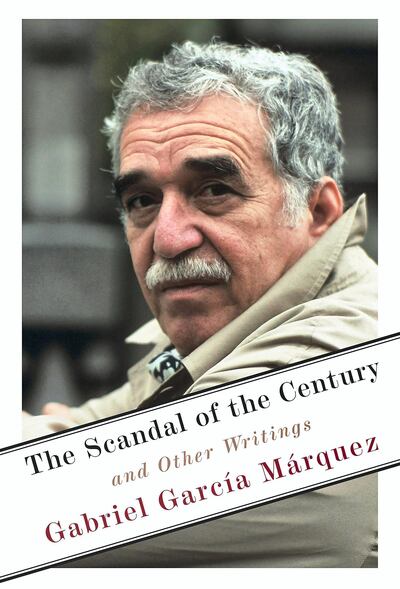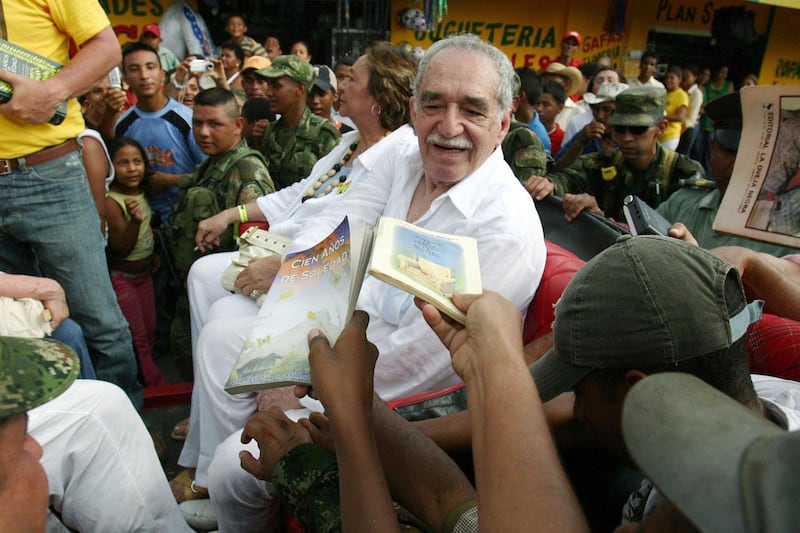Writers' posthumous publications tend to be a mixed bag, often consisting of juvenilia, unfinished poems or aborted novels. When such work is released it can feel like a desperate attempt to cash in on the last scraps of a writer's body of work, aimed squarely at the diehard completist.
It is five years since Gabriel Garcia Marquez died and last month brought the release of an anthology of the much-loved Colombian author's journalism. But anyone tempted to dismiss the book as both a cynical marketing ploy and the product of a scraped barrel should think again. The Scandal of the Century and Other Writings is a wondrous trove of his work. Deftly translated by Anne McLean, it gathers together 50 news reports, columns, op-eds, profiles and features that Garcia Marquez wrote for a variety of world-renowned publications.
The book's introduction makes it clear that there was a wealth of material to choose from. Garcia Marquez described journalism as "the best job in the world" and wrote consistently and prolifically for newspapers and magazines throughout his career, even at the height of his fame after winning the Nobel Prize in Literature in 1982.

The pieces collated in this anthology were published between 1950 and 1984. Reading them in order allows us to trace Garcia Marquez's development as a writer and marvel at his talent for telling a story, conveying emotion and getting to the heart of the matter.
Although arranged chronologically, each piece could also be grouped according to a specific topic or tone. There are several witty stories about real-life events, one of which is An Undeniable Mistake. In that story, a man wakes up in a hospital bed and reads a newspaper that describes the bizarre fish-related circumstances that prompted him to jump from the window of his third-floor apartment the previous morning.
Other, more sobering stories take their lead from grimmer news articles. In Literaturism, Garcia Marquez bewails a "spectacular homicide" committed in his homeland, saying that "as a news item it is too common and as a novel too gruesome".
The collection's eponymous piece from 1955 is a detailed account of a crime on a larger scale. Lasting for 60 pages, it is the longest piece in the book and was originally published in 14 instalments. It was not so much a stand-alone article as a serialised story. In the book, dramatic subtitles help ratchet up the tension and regular updates remind us of salient points and unsolved problems. What begins as a tragic but seemingly simplistic murder case develops into a complex mystery. After immersing ourselves in the events of the crime, investigation and trial, we come to wonder if the victim was as innocent as she first appeared, but rather someone who actually led a dangerous double life.
Such stories read like groundwork for Garcia Marquez's 1996 book and extended piece of journalism, News of a Kidnapping. Other articles shine a light on his novels – The House of the Buendias, for example, comprises notes for his 1967 masterpiece One Hundred Years of Solitude – or his approach to fiction, as seen in Misadventures of a Writer of Books, which opens with a frank confession: "Writing books is a suicidal job." How Do You Write a Novel? also provides valuable insight.
Elsewhere we find dispatches from travel assignments. In I Visited Hungary Garcia Marquez gives the reader the lay of the land one year after the failed uprising in the country in 1956. In I Can't Think of Any Title, he describes an expedition he made to Cuba in 1959, two weeks after Fidel Castro seized power.
For Garcia Marquez, the trip marked the start of a lasting relationship with both the country and its revolutionary leader. Other political pieces, such as The Cubans Face the Blockade, which focuses on the trade embargo the US imposed against Cuba in 1962, fully demonstrate Garcia Marquez's authority and his allegiance.
What makes this book all the more absorbing is the broad range of subjects on display. There are stories about telepathy, translation and the Nobel Prize. We are treated to vivid urban snapshots from his return to his home town, Aracataca; a fond discussion of Mexico; and his memories of Paris, "the loveliest city on Earth". We also meet a lonely-hearts killer, Sandinista guerrillas and Ernest Hemingway, and take a tour of "the cemetery of lost letters". One piece, a description of a fruitless trawl through news articles for inspiration, is proof that even when great writers find nothing to write about, they still have something to say.
Garcia Marquez once said he wanted to be remembered for his journalism rather than One Hundred Years of Solitude. This collection does not overshadow the best of his fiction, but its illuminating reports on the ways of the world render it a necessary accompaniment.







